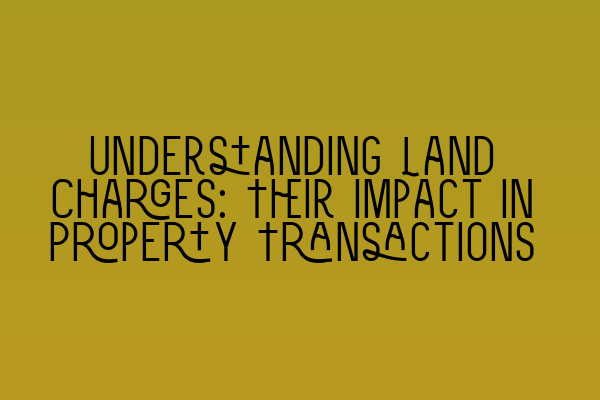Understanding Land Charges: Their Impact in Property Transactions
When it comes to property transactions, one crucial aspect that both buyers and sellers need to understand is land charges. Land charges are legal interests or rights that affect land and can have a significant impact on property transactions. Therefore, it is essential for all parties involved to have a clear understanding of land charges to avoid any potential complications or disputes.
In this blog post, we will delve deeper into the concept of land charges, their types, and their implications in property transactions. Whether you are a solicitor, a property buyer, or a seller, this information will be valuable to ensure smooth and successful property transactions.
What are Land Charges?
Land charges are registered interests or rights that affect land or property. They are usually registered with the Land Charges Department and are considered paramount to any subsequent interference with property rights. These charges are meant to protect the interests of creditors, the government, or any parties who have a legal interest in the property.
Types of Land Charges:
1. Class C Land Charges:
Class C land charges are primarily financial charges, such as judgments, court orders, or fines that a person or company owes. These charges can include child maintenance orders, bankruptcy orders, or any financial obligations imposed by a court. The presence of a class C land charge can impact property transactions as it may restrict the ability to sell or transfer the property.
2. Class D Land Charges:
Class D land charges include any obligations that affect the use or development of the land. These charges can be in the form of restrictive agreements, planning obligations, or other similar restrictions imposed by the local authorities. Class D land charges can have a significant impact on property transactions as they may restrict the buyer’s intentions for the property, such as making alterations or changing its use.
3. Other Land Charges:
Apart from class C and D land charges, there are various other types of land charges that can affect property transactions. These can include chancel repair liability, rights to buy, or rights of first refusal, to name a few. It is essential to identify all these potential land charges during the due diligence process to avoid any surprises or complications during the property transaction.
Implications in Property Transactions:
Land charges can have several implications in property transactions. Some of the key impacts include:
1. Restriction on use:
Class D land charges, such as planning obligations, can restrict the use or development of the property. Before entering into a property transaction, it is crucial to understand these restrictions to ensure that the intended use of the property aligns with the existing land charges.
2. Financial obligations:
Class C land charges, such as bankruptcy orders or court fines, can create financial obligations that need to be settled before the property transaction can proceed. Buyers need to be aware of any outstanding financial charges on the property to avoid potential legal ramifications.
3. Time delays:
Discovering land charges during the due diligence process can cause significant delays in property transactions. It is important to conduct comprehensive searches and investigations to identify any potential land charges early on in the process to avoid unnecessary delays and complications.
Conclusion:
In conclusion, understanding land charges and their implications is crucial for smooth and successful property transactions. By conducting thorough searches and investigations, both buyers and sellers can identify any potential land charges and take appropriate steps to address them. Working with an experienced solicitor who specializes in property law can provide valuable guidance and ensure that all necessary precautions are taken to mitigate the impact of land charges on property transactions.
If you are preparing for the SQE exams or looking for practice exams and preparation courses, check out these related articles:
– SQE 1 Practice Exam Questions
– SQE 1 Practice Mocks FLK1 FLK2
– SQE 2 Preparation Courses
– SQE 1 Preparation Courses
– SRA SQE Exam Dates
Your success in the SQE exams is essential to becoming a qualified solicitor, and these resources can help you prepare effectively. Good luck with your studies and future property transactions!
